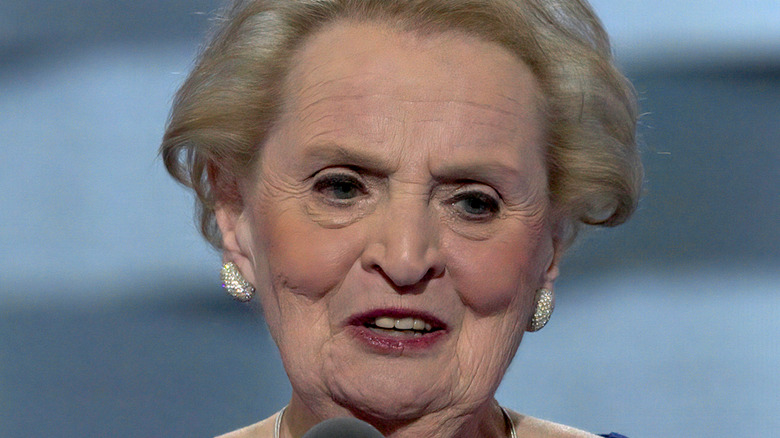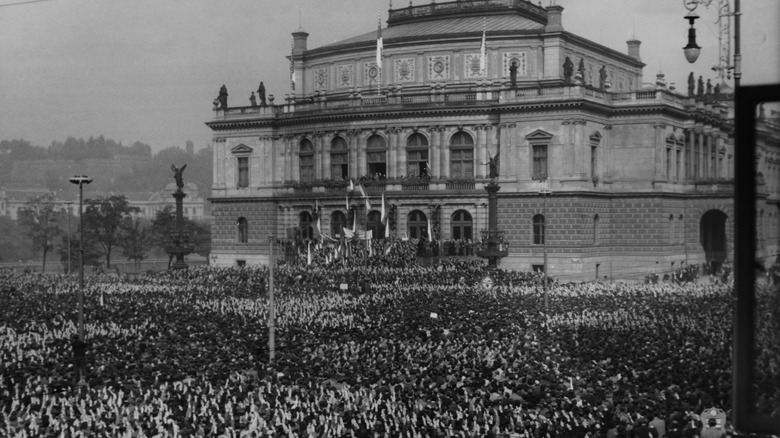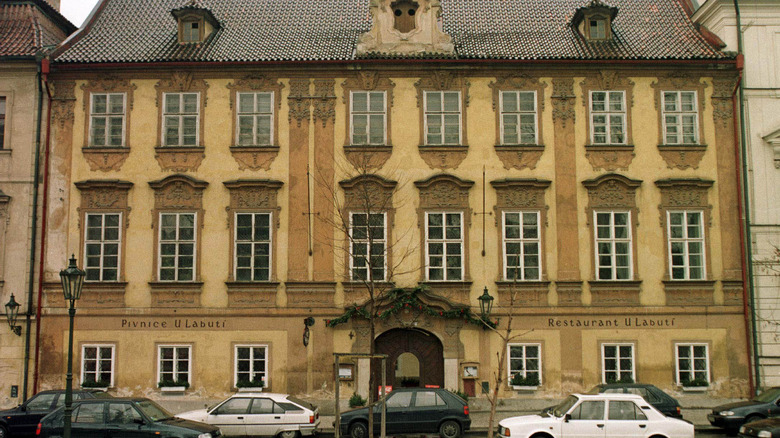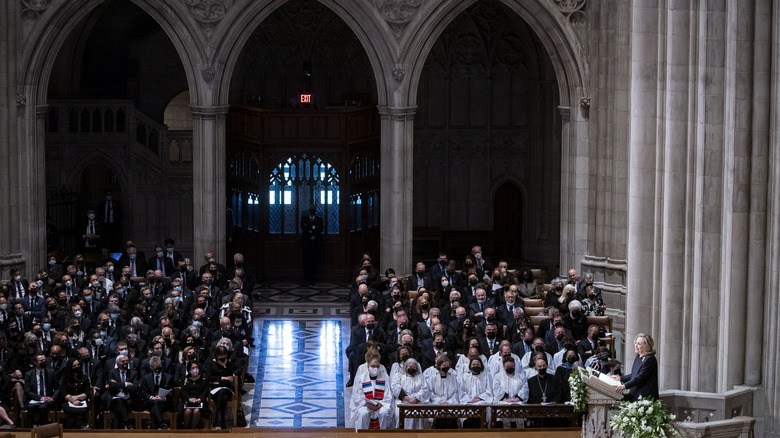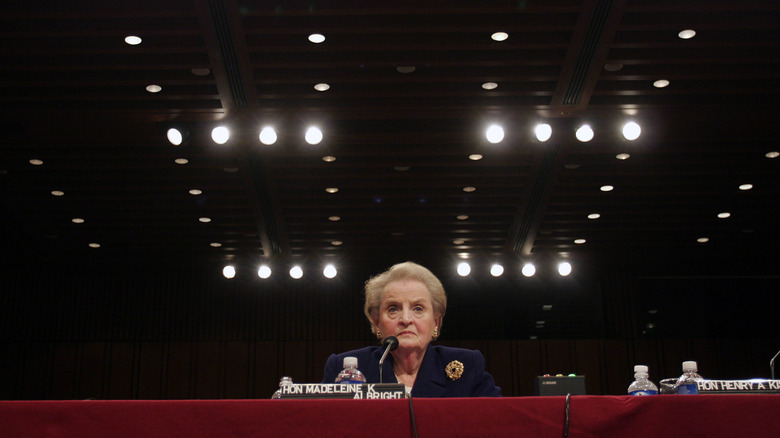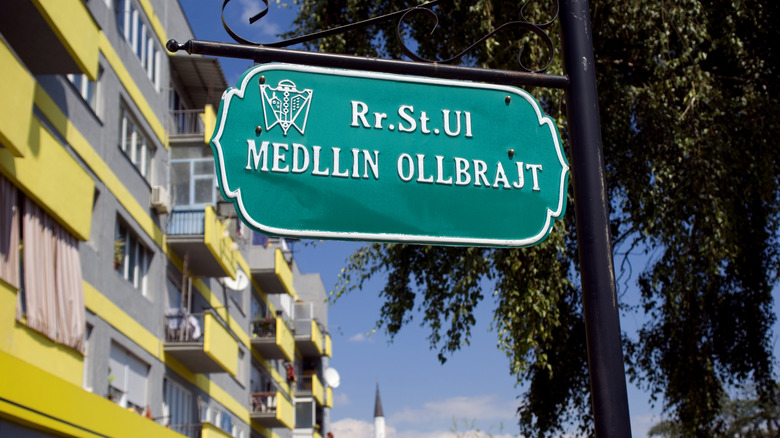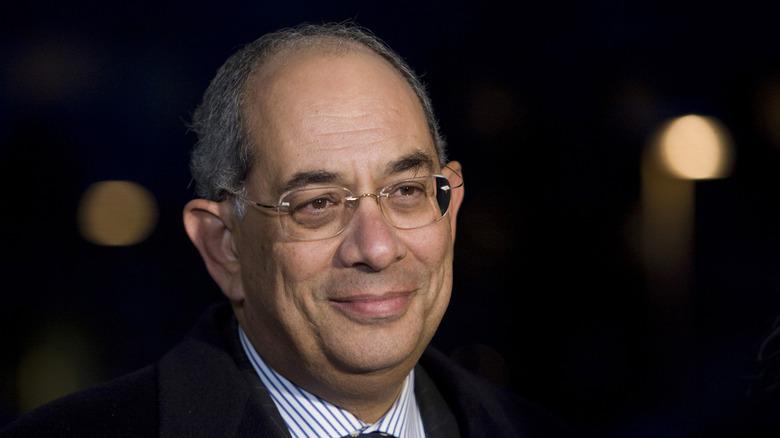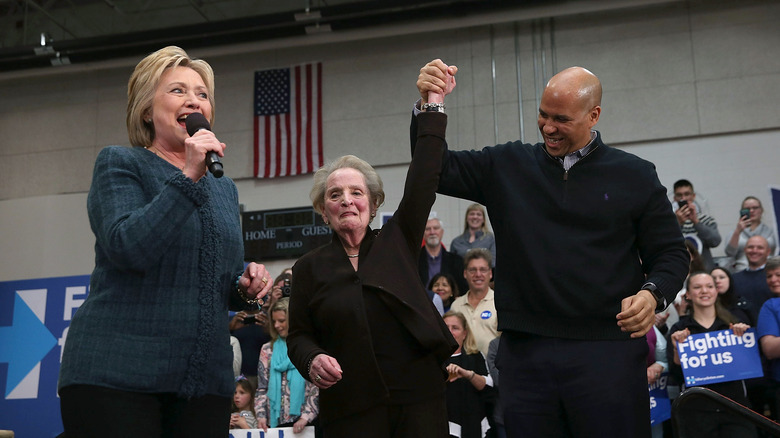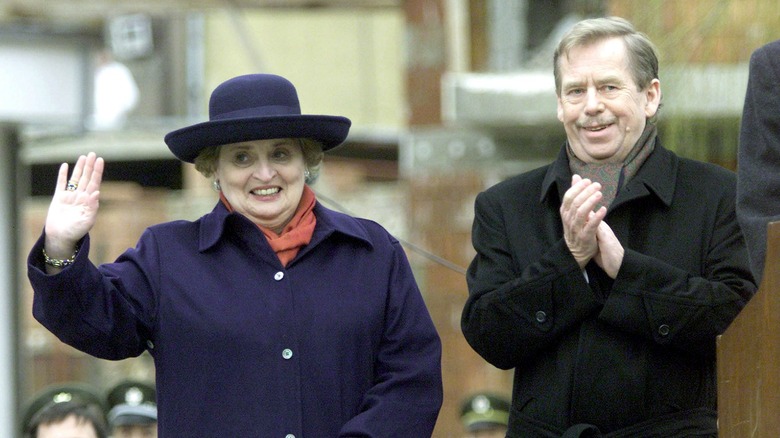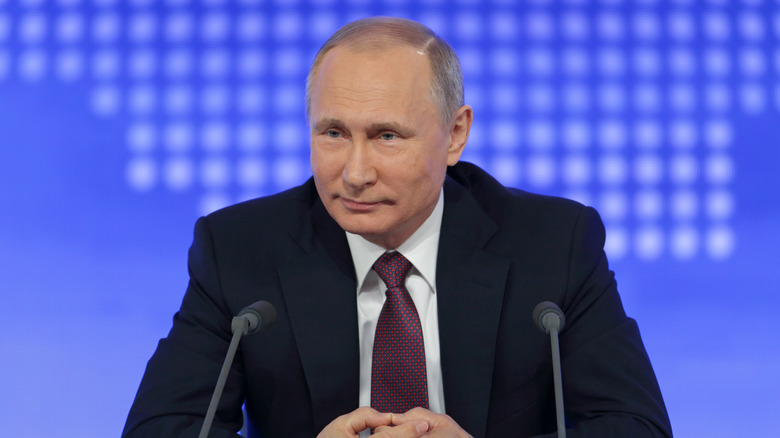The Untold Truth Of Madeleine Albright
Former Clinton secretary of state Madeleine Albright's death in March of 2022 thrust her controversial legacy and story to the forefront. Best known for being the first woman to hold the position, she had traveled a long road to get there. From escaping Nazi German occupation of her native Czechoslovakia as a child only to have to flee again once the communists took power, Albright eventually ended up in the United States as a refugee.
As a politician, she used her influence to guide the United States internationally on a policy that her supporters considered humanitarian and her detractors needlessly aggressive. She helped reorient the United Nations and increase American influence in the body and brought peace (or war, depending on who you ask) to the Balkans. On the flipside, however, she has been accused of war crimes over her support of Iraqi sanctions and regime change wars that the Bush Administration reprised in 2001. Here is the untold truth of America's controversial first female secretary of state.
Madeleine is not her birth name
The woman that became Secretary of State Madeleine Albright was born on May 15, 1937, to a Jewish family in Prague, Czechoslovakia. According to the National Catholic Reporter, she was born Marie Jana Korbel. Her birthplace and Europe were on the brink of war, and her life was soon to be turned upside-down. In 1939, according to the Washington Post, her family left Czechoslovakia, presumably following the 1938-'39 German annexation of the country.
The Korbel family took refuge in London during the war. In the meantime, Marie Jana had acquired a nickname among her relatives. According to the BBC, she was known as "Madla" or its diminutive "Madlenka" rather than by her full name. It stuck, and while attending school in Switzerland, she legally changed it to Madeleine.
With the name change, Albright took her first step to becoming the "thoroughly American Maddy." But her family did not immigrate to America immediately. Instead, they returned to Prague in 1945, where her father reprised his diplomatic career. Only once the Communist Party came to power and intensified persecution of opponents did the Korbel family apply for political asylum in 1947, eventually arriving in the United States the following year.
Her father was accused of art theft
Following the downfall of Hitler's Germany, the Czechoslovakian communists, per the JTA, expelled the country's sizable German minority (about 25% of the total population) and confiscated whatever belongings they left behind. Madeleine Albright's family became involved indirectly in the expulsions when her family moved into an apartment that had belonged to the wealthy Bohemian-German Harmer family (now residing in Austria). This move brought them into a clash with Philipp Harmer, the family's heir in the late '90s. Philipp Harmer claimed that before leaving Prague, his family transferred its most valuable assets (e.g. paintings, silver cutlery, etc.) to Philipp's great-aunt, who as a Swiss citizen, was not subject to expulsion, leaving their old apartment in Prague bare. The Harmers also claimed to have hid a variety of other valuables on behalf of persecuted Jewish families.
According to a letter from Philipp's great-grandmother, Albright's father Joseph, realizing that there were paintings missing, strong-armed first the servants and then Harmer's elderly great-aunt into handing over the valuables. Korbel took them to Belgrade and eventually to the United States, where he allegedly sold some and kept others, which are believed to belong to Albright's siblings.
Korbel family lawyers claimed that the Czechoslovakian government had expropriated the property and therefore, it was up for grabs. But there is not evidence for this. In absence of such proof, the actions would be considered naked theft, which Korbel allegedly justified due to hard times rather than malice (per Harmer's great-grandmother Ruth). The case never went to court, and the valuables currently remain in America.
Her faith journey was full of turns
Madeleine Albright's religious upbringing is almost as complicated as her early life. Albright's Jewish parents, per the Washington Post, considered themselves "assimilated Jews" whose identity was Czech first and Jewish second. Thus, Albright's household was not particularly religious and soon jettisoned its Jewish identity during the war. Sometime during their London exile, the Korbel family embraced Catholicism. The how or why is unclear, but according to the New York Times, Jewish conversions to Catholicism during the war, either out of survival, genuine belief, or gratitude (e.g. Ernesto Zolli, Rome's chief Rabbi), were common, so it is possible that one of these influenced the family decision. Accordingly, Albright identified as a Czech Catholic for most of her life.
When Albright married her husband Joseph in 1959, she joined his Episcopal Church. According to the Episcopal News Service, she became a regular presence at D.C.'s National Cathedral once she moved to the capital. Fellow parishioners remembered her as a great singer who refused to join the cathedral choir out of fear that she would stand out too much. She preferred the anonymity of the pew. When she died, she was given an Episcopal funeral at the National Cathedral.
Albright's religious journey influenced her politics too. In an interview with PBS, Albright, while supporting church-state separation, argued that keeping clergy out of politics and diplomacy was a losing strategy. Since faith often dictates worldviews and policies, she called for American politicians to employ clergy as advisors to facilitate religiously and culturally-informed decisions on the international stage.
She did not find out she was Jewish until 1997
Although she was born into a Jewish family, the Jewish Forward reported that Madeleine Albright never uncovered her family history until 1997. Her father's memoirs were mum about his family's Jewish background and the tragic fate of Albright's grandparents during the Holocaust. In fact, his memoirs did not mention the Holocaust at all. Thus, Albright believed that her family had always been Catholic and unaffected by the worst of Nazi horrors.
In 1997, a Washington Post expose revealed that Albright's family had indeed been Jewish. Now, according to former U.S. ambassador to the E.U. Stuart Eizenstadt (via JTA), this was quite a bombshell. He recalled that she phoned him in a panic, fearing that the American Jewish community would view her as a sellout to her Jewish heritage for political ends, while also experiencing a religious identity crisis. So Eizenstadt (a close friend) advised her to be honest. There was no shame in her family's story (which was typical during World War II), so she should embrace her Jewish heritage without feeling any pressure to convert to Judaism if she truly believed in Christianity.
It is said that this revelation, which made her more popular with the Jewish community, inspired Albright to take action against ongoing genocide in the Balkans, lest her grandparents' fate be meted out to other innocents during the brutal Yugoslav Wars.
She landed in hot water over Iraq
Madeleine Albright's death was mostly filled with tributes, but there were a number of statements dug up from her tenure in American politics that painted her in a less-flattering light. Albright gave an interview on "60 Minutes" in which she was asked if the deaths of 500,000 Iraqi children as a result of American sanctions on the country was "worth it." She said that Iraq's threat to regional stability justified the harsh measures.
This statement became a major stain on her legacy. Some of her harsher critics noted that the sanctions were never lifted despite no evidence for weapons of mass destruction in Iraq. Instead they were left in place even after multiple inspections and became the casus belli for the costly Operation Iraqi Freedom under George W. Bush.
So how fair was this criticism of Albright? As the Intercept notes, the context behind the line does not make things better. For context, the numbers were based on U.N. calculations that concluded an excess of 500,000 Iraqi deaths following American sanctions. However, a 2017 British Medical Journal study concluded that the mortality spike was exaggerated. But even though "60 Minutes" got the scale of death incorrect, Albright's chilling response raised questions about her personal morality and her commitment to peace. Instead, it revealed her close relationship with advocates of Middle Eastern regime change that dominated the subsequent Bush Administration.
And over Serbia, too
Madeleine Albright rankled not only Middle Eastern observers. She was equally reviled among Serbs over her role in the U.S. bombings in 1999. For context, the Balkan Wars had resulted in brutal ethnic conflicts between Serbs on one hand and Croats, Bosniaks, and Kosovar Albanians on the other.
By 1997, Belgrade had been fighting Albanian separatists in Kosovo. According to PBS, Albright championed Kosovar independence, even though scholars (via Canadian Journal of Peace and Conflict Studies) noted that the United States considered the Kosovo Liberation Army a terrorist organization due to financing from drug trafficking and organ trafficking (per Balkan Insight). On the other hand, Slobodan Milosevic's government was accused of engaging in ethnic cleansing and possibly genocide against Kosovo Albanians, just as it had done to Bosniaks several years earlier.
In the end, per Balkan Insight, the United States and NATO forces bombed Belgrade for 78 days without U.N. Security Council approval on the KLA's behalf. Albright, per PBS, supported the bombing, becoming known as a "Serb hater," while the Kosovo War was dubbed "Madeleine's War." The incident resurfaced in 2012 when pro-Serb demonstrators heckled the former secretary during a visit to the Czech Republic (via the Atlantic). In the video of the incident, the demonstrators called Albright a "war criminal." She returned the insult, called them "disgusting Serbs," and ordered them to get out.
Kosovo loved her
While Madeleine Albright's support for NATO's 1999 bombing of Belgrade was vilified in Serbia, she became a Kosovar hero. According to Barrons, Kosovo announced a national day of mourning and even installed a bust of Albright in the capital Pristina alongside a statue of President Bill Clinton.
The Kosovar view of the conflict was one of national liberation. As Britannica noted, Albanian Muslims formed the majority of Kosovo's population. The province, however, was sacred in Serbian folklore as the site of the eponymous 1389 battle against the Ottoman Turks and the seat of the Serbian Orthodox Church. Neither side wished to compromise, so violence broke out.
According to PBS, as the violence in Kosovo degenerated into ethnic cleansing, Albright masterminded American intervention in the conflict. According to Euro News, her family history influenced her decision to make a show of force and avert genocide. The three-month bombing campaign was widely credited in Kosovo with forcing a Serb withdrawal and allowing a ceasefire. While Albright's intervention was credited as humanitarian, Serbian and Russian critics (via B92) accused American political and military figures of profiteering through exclusive contracts over Kosovar infrastructure. Albright's firm obtained a 75% stake in Kosovo Telecom. Thus, Serbia argued that Albright's Kosovo interests were motivated by profit, not humanitarian concerns.
She took down the U.N. Secretary General Boutros Boutros-Ghali
Egyptian Boutros Boutros-Ghali was the U.N. secretary general during the tumult of the '90s and an opponent of the Clinton Administration. The rift began in 1993, when, according to the Washington Post, the Clinton Administration faced a PR disaster following the Black Hawk Down incident in Somalia. President Bill Clinton blamed the U.N. for the raid's failure and tasked U.N. ambassador Madeleine Albright with delivering U.S. complaints to Boutros-Ghali. The pair would clash repeatedly over the ensuing years.
The accusations were legion. Albright accused Boutros-Ghali of anti-American bias, while the secretary general accused the U.S. of withholding U.N. dues and interfering with the U.N. commanders' control of peacekeeping forces. Albright in turn accused Boutros-Ghali of abetting genocide in Bosnia and panned his criticism of NATO strikes against Serb forces. Boutros-Ghali accused Albright and the Clinton Administration of selective outrage for ignoring the 1994 Rwandan Genocide in favor of Bosnia and Kosovo. In the end, Albright, who at the time was U.S. ambassador to the U.N., sought to oust him.
According to American official Richard Clarke, Albright and several others entered into "Operation Orient Express." Knowing that Boutros-Ghali enjoyed support from the developing world, they had to offer an acceptable alternative (i.e. non-European) secretary general candidate – preferably another African. So Albright first exercised the American veto over Boutros-Ghali's candidacy, forcing Africa's representatives to settle on Kofi Annan of Ghana as a compromise candidate. Boutros-Ghali lost his position — to the American's satisfaction — but Africa kept the position of secretary general.
She divided the Dems in 2016
Following the end of the Clinton Administration, Madeleine Albright became a private citizen again, giving talks and writing books as many politicians do in retirement. In 2016, she emerged to confront Donald Trump, whose 2016 presidential bid had against all odds captured the Republican nomination and placed the New York billionaire in the position to defeat Hillary Clinton.
According to the Hill, Albright considered herself a feminist and a strong Clinton supporter. While stumping for the Clinton campaign in New Hampshire alongside New Jersey senator Cory Booker and Clinton herself, Albright remarked that there was a "special place in hell for women who don't help each other."
Naturally, female supporters of Clinton's primary rival Bernie Sanders were not impressed. The line itself was nothing new – Albright had used it many times before. But because of the context, she was forced to defend herself in the New York Times. Albright apologized for her word choice but stood by the sentiment. Her beliefs dictated that women should support each other in opposition to societal pressure for women to tear each other down. By supporting the female candidate who understood their positions – Albright argued – women could present a united electoral front to assert their interests, whether upholding Roe v. Wade or protecting Title IX.
President Albright?
Although Madeleine Albright was a naturalized American citizen, the Czech political class did not forget her. According to the Washington Post, Czech president Vaclav Havel was worried that political rival Vaclav Klaus would succeed him. So he suggested that the Czech-born Albright become president instead. It was not the first time he had floated such an idea. He had mentioned it in 1998. And he was deadly serious.
Albright met all of the qualifications. Under Czech law, anyone that fled the country before 1948 was entitled to regain citizenship and full political rights regardless of naturalization elsewhere. She was over 40 years old, and since the president in the Czech Republic is elected by parliament instead of the public, she probably had enough clout to pull it off.
But according to the Indian Express, there were problems. First, Klaus and his supporters thought it inappropriate to install a member of a foreign government as Czech president. Second, Albright had not claimed her Czech citizenship. Third, she had no interest in the proposal or in holding any political position at all in the Czech Republic. Despite "unshakable pride in [her] native land," she had an "unshatterable" commitment to the United States – her adopted home. In the end, Albright was polite about it but refused the invitation. According to the Prague Castle's website Hrad (the Czech equivalent of the White House), Klaus succeeded Havel as president in 2003, and the matter died down.
She called Vladimir Putin a reptilian
As the Clinton Administration came to an end in 2000, Russia's short experiment with economic liberalization under Boris Yeltsin also drew to a close with the accession of Vladimir Putin. At the time, the new Russian president was seeking better relations with the west, possibly even joining NATO, per the alliance's ex-head (via The Guardian).
Madeleine Albright recalled her first meeting with Putin. She was struck by him. According to an op-ed she wrote in the New York Times, she described Putin as "small and ... so cold," as opposed to the bombastic and gregarious Yeltsin who filled the room. Putin, however, was "almost reptilian."
It is unclear what exactly Albright meant with the reptilian comment, but she foreshadowed Russia's foreign policy in noting that Putin's biggest concern at the time was restoring Russia's flagging image on the international stage. The country's reputation had been damaged by the defeat in the First Chechen War while its economy was a disaster after a stock market meltdown in 1998. Albright's reading of the Russian president in this regard would prove prescient, as Putin has pursued an irredentist policy in Ukraine in part over the status of Russian minorities there.
She claimed to leg press 400 lbs
Ending on a funny, non-political note, Madeleine Albright lived through a bizarre period of the early 2010s in which multiple VIPs bragged about their fitness. According to ESPN, televangelist Pat Robertson was at the forefront, claiming to have leg-pressed 2,000 lbs, likely as PR to sell his protein supplements. Madeleine Albright also got in on the craze, claiming that she could press 400 lbs in 2015 – despite being 78 years old.
According to the Huffington Post, Albright made a commitment to fitness as she aged. Lance Armstrong claimed to have worked out with her once in a tweet, during which she "[crushed] the elliptical next to [him]." She was known to be an advocate of strength training to fight the deleterious effects of aging on the body, and generally, her claim to press 400 lbs is considered legitimate, unlike Robertson's claim, which Slate notes, would have broken the then-world record by 600 lbs.
Now, the gym bros at Slate were unimpressed with either claim. Slate called the leg press "the world's lamest exercise," suggesting it was nothing to be proud of because it is also one of the easiest to perform with high weight. But even though this is true, Albright still deserves props for keeping herself in shape even at 78. At that age, 400 lbs on a leg press is no mean feat.
